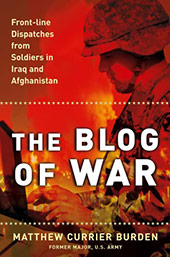intro | ch1 | ch2 | ch3 | ch4 | ch5 | ch6 | ch7 | ch8 | epilogue
Introduction
Burden’s book begins with the story of Major Mathew E. Schram, a support operations officer killed in an insurgent ambush outside Al Asad Airbase in western Iraq. Major Schram, a long-time friend to Burden, was killed by a round of RPG (Rocket Propelled Grenade) fire on his convoy. Burden notes that Schram’s death and the lack of news media attention it received was the primary motive behind his decision to start a blog, blackfive, a name that represents his designated call-sign. Burden claims that the September 11, 2001, terror attacks marked a distinctive turn in the United States' curiosity about news and political events. Coupled with the evolution of blogs as an increasingly popular media form, Burden asserts that the popularity of blogs among military personnel arose as “ideal for filling in the gaps that both the media and the military left out of the war” (pp. 3-4). This “gap filling” function of the blog also points to the ways in which combat reporting has changed as well. Burden notes that combat correspondents, journalists assigned to follow troops, and Department of Defense press releases provide only partial insights into conflicts. The immediacy and frequency of soldiers’ blog posts, however, allow for what Burden calls “a new honesty and urgency” in combat reporting (p. 4). Burden attributes the purpose of military blogs to sharing “the good, the bad, the ugly, and the humor of military life” and providing “an uncensored, unmediated, intimate, and immediate view of the reality of this conflict” (p. 5).
Burden makes several claims about the power of blogs as a source of immediate self publication and the authority of “uncensored” and “unmediated” stories from soldiers about the war. This power arises out of what appears to be a mistrust of the mainstream news media, and while Burden notes that the Department of Defense reports of military operations also lack accuracy and detail of combat operations, the bloggers in this collection (and after reading his blog, I suspect Burden himself) post primarily to counter what they view as a liberal media bias against the War on Terror. Many of the bloggers included here name this bias directly. Burden’s claim about the unfiltered and “unfettered access” to information about the War on Terror (p. 4) that blogs provide may require some qualification (as most personal blogs are not widely read, and I assume most bloggers include editing as part of their writing process); however, his claim that blogs offer a new kind of honesty and urgency to war reporting that differs from reports written by the Department of Defense or mainstream media outlets is a more compelling reason for further examination of soldiers’ blogs.
